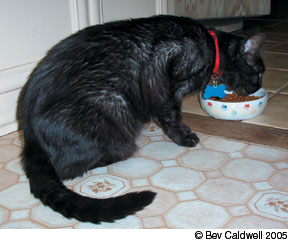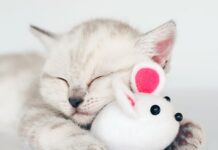The senior cat is not part of a uniform population, says Julie Churchill, DVM. My biggest emphasis regarding nutrition for the older cat is to treat her as an individual. Dr. Churchill, who is a veterinary nutritionist with the University of Minnesota College of Veterinary Medicine, adds that there is no absolute guideline on what constitutes an older cat, but its generally an animal older than eight or ten and in the second half of her life expectancy.
Joe Bartges, DVM, professor of medicine and nutrition at the University of Tennessee College of Veterinary Medicine, agrees. There is no magic age here, and it depends on the breed, he explains. Regardless of age, there are different types of geriatric animals, and dietary recommendations should be made not so much on chronological age, but on metabolic age.

288
By metabolic age, I am referring to how they digest, absorb and utilize nutrients and their ability to expend energy in the form of activity. Some older animals are very efficient at utilizing nutrients and are still active. There is no reason to restrict energy, protein, etc. in these animals.
Both veterinarians caution against changing a cats diet simply because she is getting older. According to Dr. Bartges, in older animals that are consuming maintenance foods and that maintain weight and activity, there is no reason to switch.
But it all depends on your particular cats situation, Dr. Bartges explains. If an older animal gains weight on maintenance foods, then feeding a diet that is higher in fiber, lower in fat and lower in energy content may help keep weight off. If an older cat cannot maintain weight and condition on maintenance foods, then feeding a diet that is higher in energy and protein may help keep the weight on – diets such as growth diets or critical care diets, for example. Lastly, in older animals with diseases, there are therapeutic diets available for many disease states that may help.
Extra A, B and C?
Should older cats be given vitamins? If your cat is on a good quality food, then additional vitamins or minerals are not required, says Dr. Bartges. Depending on the individual pet, other supplements may be indicated – for example, fish oil or glucosamine/ chondroitin sulfate. He emphasizes that use of supplements needs to be tailored to the individual cat. Many supplements are indicated for treatment or management of certain diseases – for example, taurine for some cats that have a certain type of heart disease (dilated cardiomyopathy), or fish oil to help decrease inflammation, as with itchy skin due to food allergies.
Dr. Churchill says that in the realm of pet food, there is no standard for the industry on a nutritional profile for a senior cat. Different brands of senior cat food are not equivalent and may have different ingredients or different percentages of ingredients.
She is very concerned about a growing problem. Although excessive thinness becomes a concern as cats progress through their later senior years, the opposite problem is a bigger issue during the earlier stages. As cats enter the second half of their life expectancy, the number one nutritional concern is obesity. Almost half the older cat population is overweight or obese, she warns, citing a mid-1990s University of Minnesota study of over 120,000 dogs and cats. My clinical impression is that obesity in cats is increasing. Twenty pound cats are no longer rare in my [nutritional] practice.
She adds that indoor cats are at increased risk because they tend to be exercise-restricted.
Overweight and obesity also lead to further health risks, says Dr. Churchill, such as diabetes, lameness and skin disease. Her advice to cat owners on this widespread nutrition problem is simple, but serious.
(1) Be aware. The threats of overweight and obesity are serious.
(2) Prevention is ideal. It is much better to maintain wellness rather than to treat disease.
(3) Its never too late. Put your overweight or obese cat on a gradual weight-loss regimen with the nutritional advice of your veterinarian.


